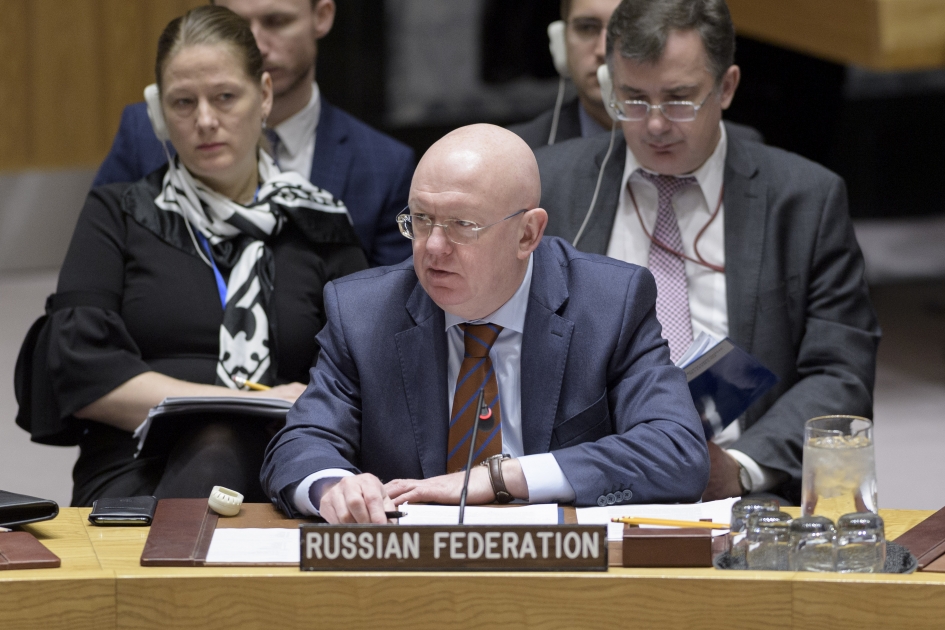Statement by Permanent Representative Vassily Nebenzia at a Security Council debate on countering terrorism and extremism in Africa
Mr. President,
At the outset, let me express our appreciation to the Chinese side for the initiative of holding a UNSC debate dedicated to the pressing problem of countering terrorism and extremism in Africa. We thank our today’s briefers Ms.DiCarlo, Ms.Mohammed, and Mr.Mar Dieye.
We join the corresponding Presidential Statement (PRST) that was timely prepared upon proposal of our Chinese colleagues. Alongside with other UNSC members we reiterate our solidarity with governments of countries of Sahel, Lake Chad Basin, and the Horn of Africa in their legitimate efforts to counter terrorist threat. At the same time, we would like to stress that security threats and challenges that we discuss today, sadly enough, become urgent for the entire African continent.
Let me avail of this opportunity to express our heartfelt condolences to the friends and relatives of peaceful citizens, military servicemen, and law enforcement officers of the countries of Africa, whose lives were taken by the surge of terror and violence that has swept through the continent over the recent months.
Today the devastating effect of extremism and terrorism is most clearly seen in Western Africa, where the number of terrorist crimes has increased several-fold over recent years. The situation is aggravated by the transfer of a number of radical forces under the banners of ISIL, transformation of ISIL into a broad underground terrorist web, and creation of its new “affiliated branches”. Therefore, the PRST adopted today accentuates the need to fully implement UNSC sanctions with regard to ISIL divisions in Western Africa, Greater Sahara, and Libya.
After ISIL’s military defeat in Syria and Iraq, flows of foreign terrorist fighters (FTFs) have run to Africa. Behind the masks of migrants and refugees they carry out subversive and recruitment activities, preach extremist and terrorist ideology among the young people and the vulnerable groups of population. Our Western colleagues on a regular basis advocate for numerous projects of technical assistance to the African countries based on the politicized concept of preventing violent extremism (PVE). In this regard we would like to make several points.
Firstly, any technical assistance in the designated area must only be provided upon request of affected states. Thereby one needs to be mindful of the fact that far not every country accepts prevention mechanisms, where the leading role is played by non-governmental entities. There is no doubt that the civil society should involve in prevention of extremism and terrorism. For example, clergy, public opinion leaders, Media, educational facilities, and sports organizations contribute immensely to this activity. However, all of this will turn out useless if state bodies do not coordinate these efforts, while fully recognizing their primary responsibility for maintaining public safety.
I will not dwell in detail on Russian approaches to the prevention of the spread of terrorist ideology now, because an open briefing on this topic will be held on March 16, jointly with the UN Office of Counter-Terrorism.
Secondly, when assessing regional states’ requirement of external aid, primary attention should be paid to implementation of universal anti-terrorism conventions and protocols, UNSC resolutions, and regional mechanisms. We commend the efforts of the African Union at this track. Besides, we suggest that the regional states should have a closer look at the novelty SCO Convention on Countering Extremism that is open for joining by all interested parties.
Thirdly, as per the Presidential Statement that we adopted today, states and specialized international organizations should take a well-balanced approach towards analysis of conditions that favor the spread of terrorism, while paying equal attention to both external and internal factors.
Undoubtedly, solution to social and economic problems, including decrease of unemployment, could eradicate the nutrient medium for terrorists. At the same time, as we stated earlier, and as it is correctly noted in the PRST, the present outburst of terror has much to do with the phenomenon of FTFs and the expansion of major terrorist groups – which are external causes.
In reality, there are many more such factors. In due time, some countries failed to notice that attempts to establish “controlled chaos” are inevitably followed by losing control of the situation. Ruining of statehood in Libya pre-determined the nature of current terrorist threat in Africa. It is quite evident that without progress in Libya’s recovery, one can hardly talk of progress in countering terrorism in the region.
The Libyan context cannot be cast aside when it comes to our priority task outlined by today’s document: countering terrorists’ recharge with arms. In his latest report on small arms and light weapons, the UN Secretary-General expressed concern regarding a “large amount” of arms from Libyan stocks that finds its illegal way to countries of the Sahel and beyond. It means the flow of arms does not go down even 9 years after the civil war started in Libya. Unfortunately, not all countries are equally concerned by this problem.
Mr. President,
In conclusion, we would like to highlight that Russia closely monitors the development of the situation in Africa’s key regions. We already provide relevant military and technical assistance to a number of countries, train police and military staff. We call upon the global community to join efforts when providing assistance to the African countries and focus it on truly important aspects of combating extremism and terrorism.
Thank you.
